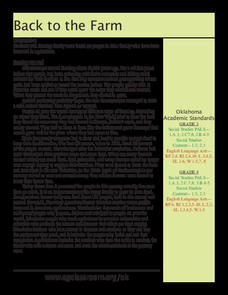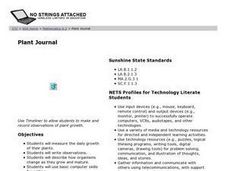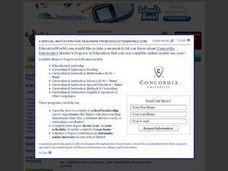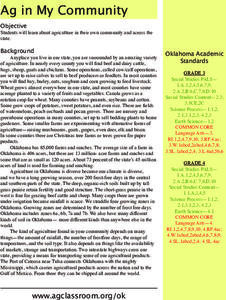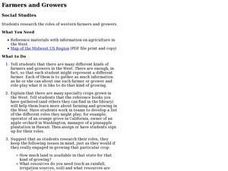Curated OER
Back to the Farm
Read up on farming and ranching and connect this information to your learners' lives. After reading, send class members home to fill out a family tree and trace their family history, focusing on farming and ranching backgrounds. Once...
Curated OER
Plant Journal
Students measure the daily growth of plants in this technology-based science lesson that uses Timeliner to record student data. The lesson allows students practice at basic computer skills (typing/data entry).
Curated OER
Land Use in New Hampshire: Farming
Students examine how the environment as affected people farming in New Hampshire. They visit a field trip to a local farm to make observations. They create a poem based on their observations.
Curated OER
Seeds of Life
Students match real seeds with the corresponding names of fruits and vegetables. They answer discussion questions, and glue the seeds on the correct squares of a chart.
Curated OER
Food For Thought: A Geography of Minnesota Agriculture
Students participate in hands-on activities and discussions about Minnesota's agriculture. They practice reading maps and locating where certain agricultural products are found throughout the state.
Curated OER
Agriculture
Students examine the types of agriculture in their own state and in their local community. They examine how food makes it to their local grocery store. They compare data from different states.
Curated OER
Seeing Soil
Students study the characteristics of different soil samples. They examine how soil provides some of the basic needs for life and food.
Curated OER
Gluten and Balloons What Do They Have In Common?
Students examine the purpose of gluten in bread making and what type of flour is needed to make bread. They compare the properties of a balloon to bread dough to explain yeast fermentation. They make bread.
Curated OER
Grain Properties Activity
Pupils study the similarities and differences of five different grains. They analyze the characteristics of corn, sunflower, milo, wheat, and soybeans.
Curated OER
Kansas Foods A Data and Probability Investigation
Learners study a number of food products and anticipate which are derived from Kansas crops. They make a list of words associated with the food stuffs and graph the results.
Curated OER
Charlotte's Web Animal Research Projects
Students summarize information taken from the internet about animal character's from the story, "Charlotte's Web." Questions are created, answered, and entered into a book about the animal of their choice.
Curated OER
Farmers and Growers
Students explore the lives and work of the farmers and growers of specialty crops of the West. The amount of land and natural resources needed, the fertilizers utilized, and the market available for the crops are investigated in this...
Curated OER
Food and Fiber: Helping the Environment and You
Fourth graders explore the many uses of corn-based products and the importance of water resources. They consider how biodegradable products help to keep water clean. They perform experiments to observe how corn pellets dissolve while...
Curated OER
Amazing Mazes
Students locate corn mazes and explain how they are an example of farm tourism. They search for sites within their community that could generate farm tourism.
Curated OER
Homer T. Cat, Poem
Students read a poem about a cat. Students discuss how cats behave and examine Homer's life in his environment.
Curated OER
Decomposers at Work!
Students design and conduct investigations that illustrate the process of decomposition. After a lecture/demo, students simulate the process of soil composting in the classroom. They closely chart the decomposition of their soil.


